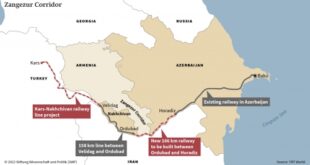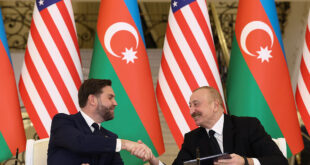 Stavropol Krai’s human rights ombudsman Aleksei Selyukov last week sent a complaint to the krai prosecutor about alleged massive violations of human rights in the town of Ivanovskoe in the Kochygbeevskoe Raion on the night of 11 June, when Interior Ministry troops reportedly rounded up more than 30 local youths at the town’s disco, yufo.ru and Regnum reported on 17 June.
Stavropol Krai’s human rights ombudsman Aleksei Selyukov last week sent a complaint to the krai prosecutor about alleged massive violations of human rights in the town of Ivanovskoe in the Kochygbeevskoe Raion on the night of 11 June, when Interior Ministry troops reportedly rounded up more than 30 local youths at the town’s disco, yufo.ru and Regnum reported on 17 June.
The police, armed with rubber truncheons and submachine guns, loaded the youths — most of whom were between the ages of 14 and 23 — onto a police bus and took them to a local police station, gazeta.ru reported. There they were forced to face the wall with their hands in the air without speaking. They were searched, their mobile phones taken away, and their passport information was taken down.
According to some of those detained, the police intimidated them, shoving them and striking them in such a way that they wouldn’t leave bruises, gazeta.ru reported. The police then allegedly illegally photographed and fingerprinted the young men. Then after about two hours, they were released into dead of the night to walk home or hitch rides back to their village more than 15 kilometers away.
Local residents believe the event was an act of revenge by the police. According to gazeta.ru, a 29-year-old police officer was knifed to death in the neighboring town of Nevinnomysskoe in May. Local residents believe the police officers thought a raid on the Ivanovskoe disco would send a message to all the young people in the area.
Nearly a year has elapsed since Russia experienced the terrorist takeover by Chechen fighters of a school in Beslan, North Ossetia, that left more than 300 people dead. At a 9 June RFE/RL briefing, Tanya Lokshina, chairwoman of the Moscow-based Demos Center for Information and Research, and Yuri Dzhibladze, president of the Moscow-based Center for the Development of Democracy and Human Rights, argued that Beslan has become Russia’s analogue to 11 September 2001, and federal and local authorities, at the initiative of President Vladimir Putin, have described Russia as a “fortress under siege.” The dominant message to the public is that Russian society must consolidate in the face of the terrorist enemy. In this environment, opposition and criticism are labeled “traitorous.”
Russian human rights groups, which are often the recipient of financial support from abroad, have been subjected to increasing scrutiny by the authorities, particularly those groups that deal with sensitive issues such as torture and other forms of abuse by police and the security services. As a result, the attention of such groups is being diverted away from such monitoring and toward defending themselves.
According to a survey conducted by the Levada Analytical Center in May, approximately 70 percent of respondents said they or their relatives could fall victim to illegal actions by law enforcement officers. In the same study, 73 percent of physicians and nurses providing primary medical assistance to victims of accidents or assaults said they believe the problem of police violence against detainees is quite serious.
The recent police raid in Ivanovskoe appears to replicate in miniature similar police raids in other parts of Russia. In February and March, the Tver Oblast town of Bezhetsk experienced two police raids in which police allegedly beat large numbers of people. One of the Bezhetsk raids was also carried out in a local disco and was rumored to have been motivated by revenge after some local young men reportedly tried to free an acquaintance who had earlier been taken into custody for “hooliganism.”
In December, there were massive police raids in Blagoveshchensk, Bashkortostan, where local police have been accused of illegally detaining and assaulting hundreds of local residents. Similarly, in Blagoveshchensk, an initial theory about the raids in that city was that they were conducted to punish city residents after three police officers were beaten up shortly before the raids began.
According to a report published in March by Demos and Public Verdict in March on the law enforcement system, one of the primary reasons for police officers violating human rights is to protect the interests and the status of their colleagues. According to the report, “most frequently law enforcement officers use their authority and means of coercion to penalize individuals who have acted against other law enforcement officers, as well as to help their colleagues avoid liability for violations that they have committed.”
Speaking at the RFE/RL briefing, Lokshina commented that the only reason the Russian public came to hear about Bezhetsk was because the raids occurred so close in time to the media storm about the raids in Blagoveshchensk. “We investigated the situation in Bezhetsk quite carefully,” Lokshina said. “The only reason we know about Bezhetsk is because Blagoveshchensk was so bad, so scandalous, and attracted so much media attention that because of it small-scale events such as Bezhetsk became known. I am quite sure that events like Bezhetsk — not a thousand people, but a couple dozen — are actually quite common in Russia.”
While investigations about the incidents in Bezhetsk and Blagoveshchensk are still under way, Dzhibladze concluded that the roots of such occurrences can be found not in Tver Oblast or Bashkortostan, but in Chechnya. “One of the clear roots of police violence is Chechnya,” Dzhibladze said. “[Police] troops and officers are rotating there every half a year. They go back home and bring the experience of violence with impunity. The government is promoting such impunity — there have been just a few cases where officers have been punished for crimes against civilians in Chechnya, out of — you can imagine — hundreds of cases in two wars. This gives a powerful, powerful signal to state agencies and forces that they are immune from prosecution whatever they do.”
To support their comparison between the recent police raids and the conflict in Chechnya, Lokshina noted that a human rights lawyer working in Blagoveshchensk recently uncovered an internal Interior Ministry (MVD) document that described how police in “emergency circumstances” should organize “filtration centers” for the detention of suspects and their associates. “The lawyer found a certain MVD document stamped ‘DSP,’ or ‘for internal use,’ in which it is described how law enforcement should handle emergency circumstances — not emergency situations as is already stipulated in the relevant law — but some mysterious emergency circumstances. Within these mysterious emergency circumstances, the police have to organize filtration centers. It’s there on paper. It’s exactly what has been going on in Chechnya for years and now we suddenly find out that in any Russian city there can be a filtration center.”
 Eurasia Press & News
Eurasia Press & News



